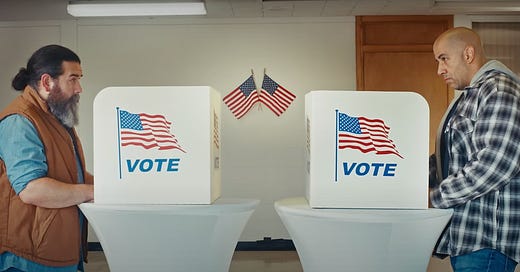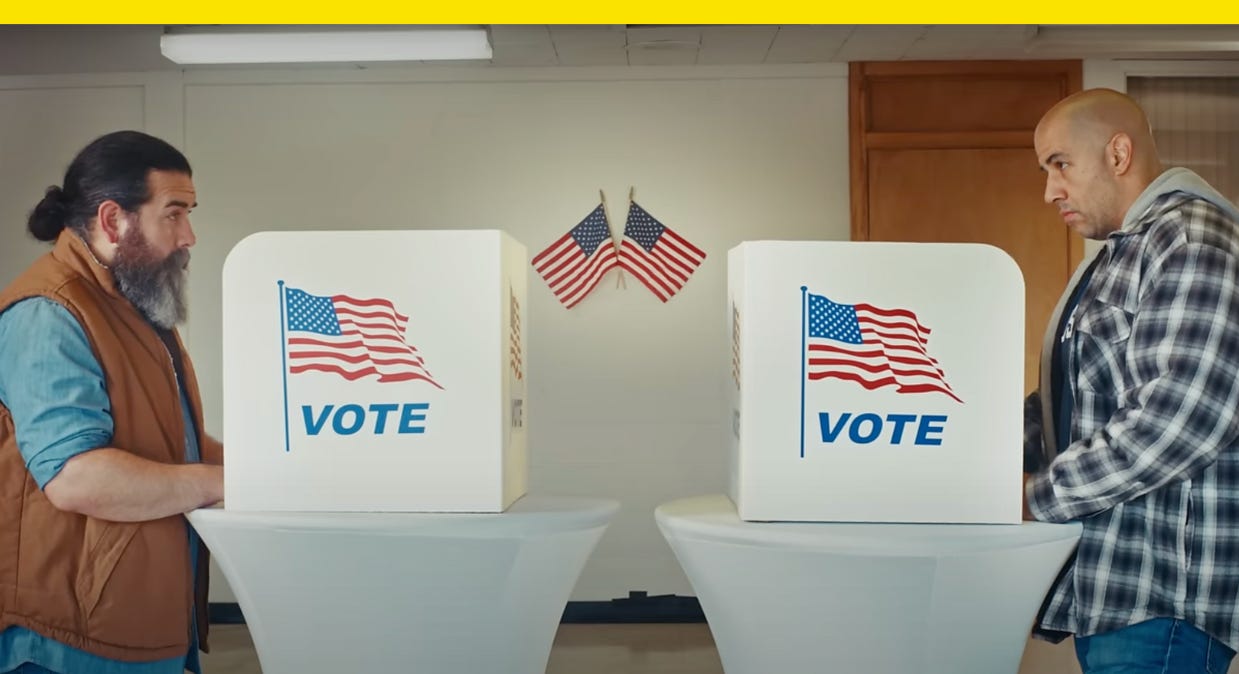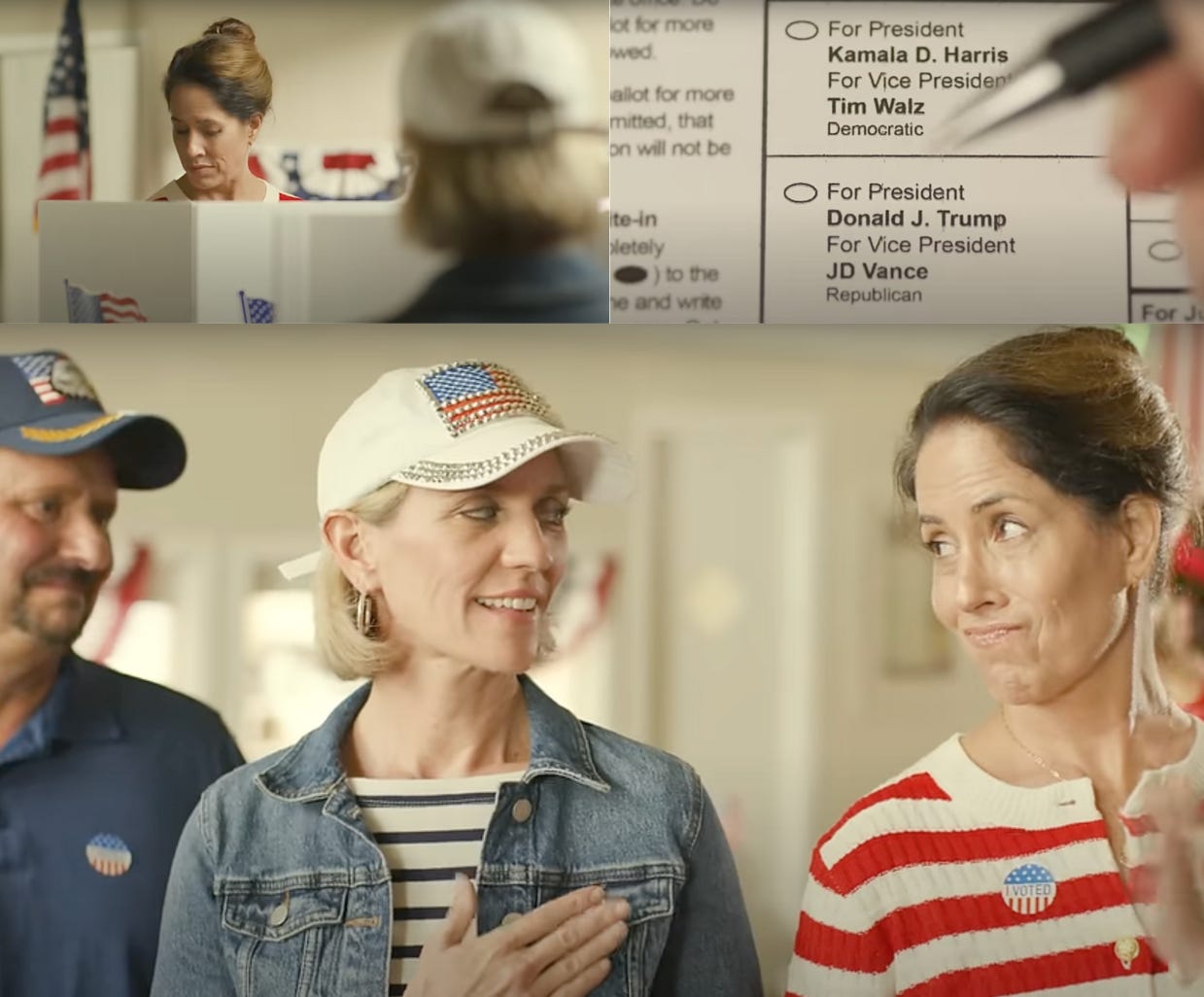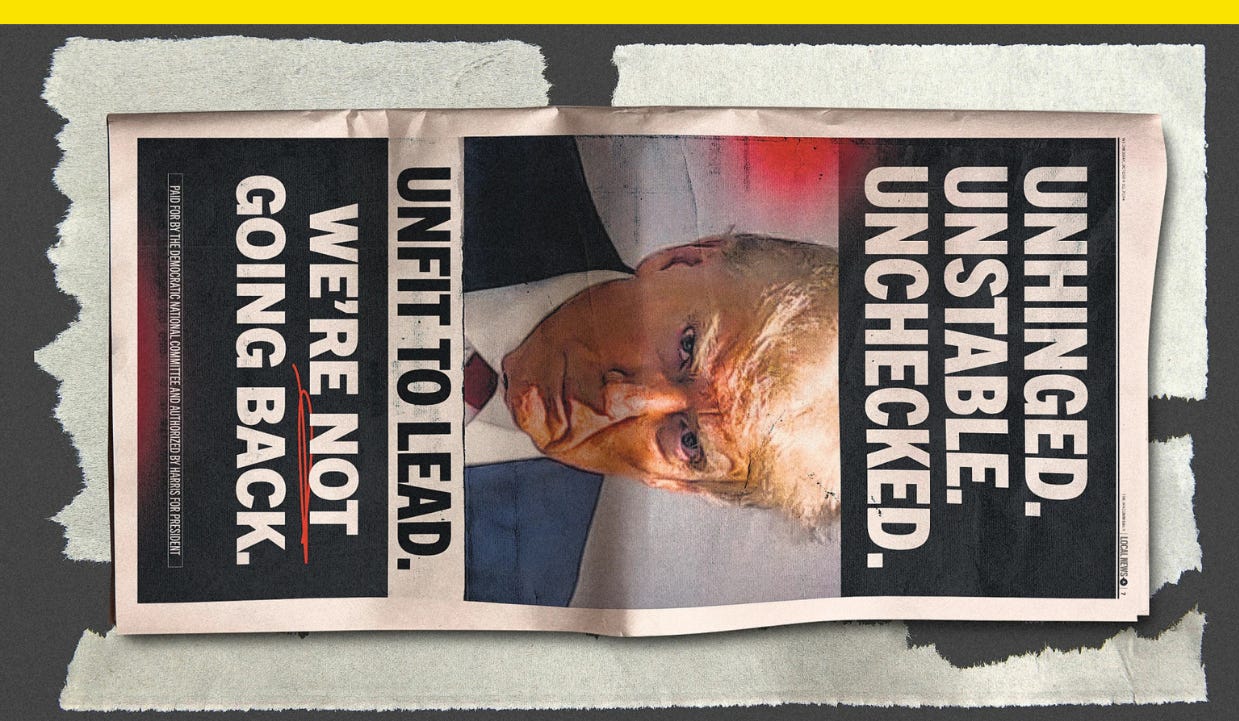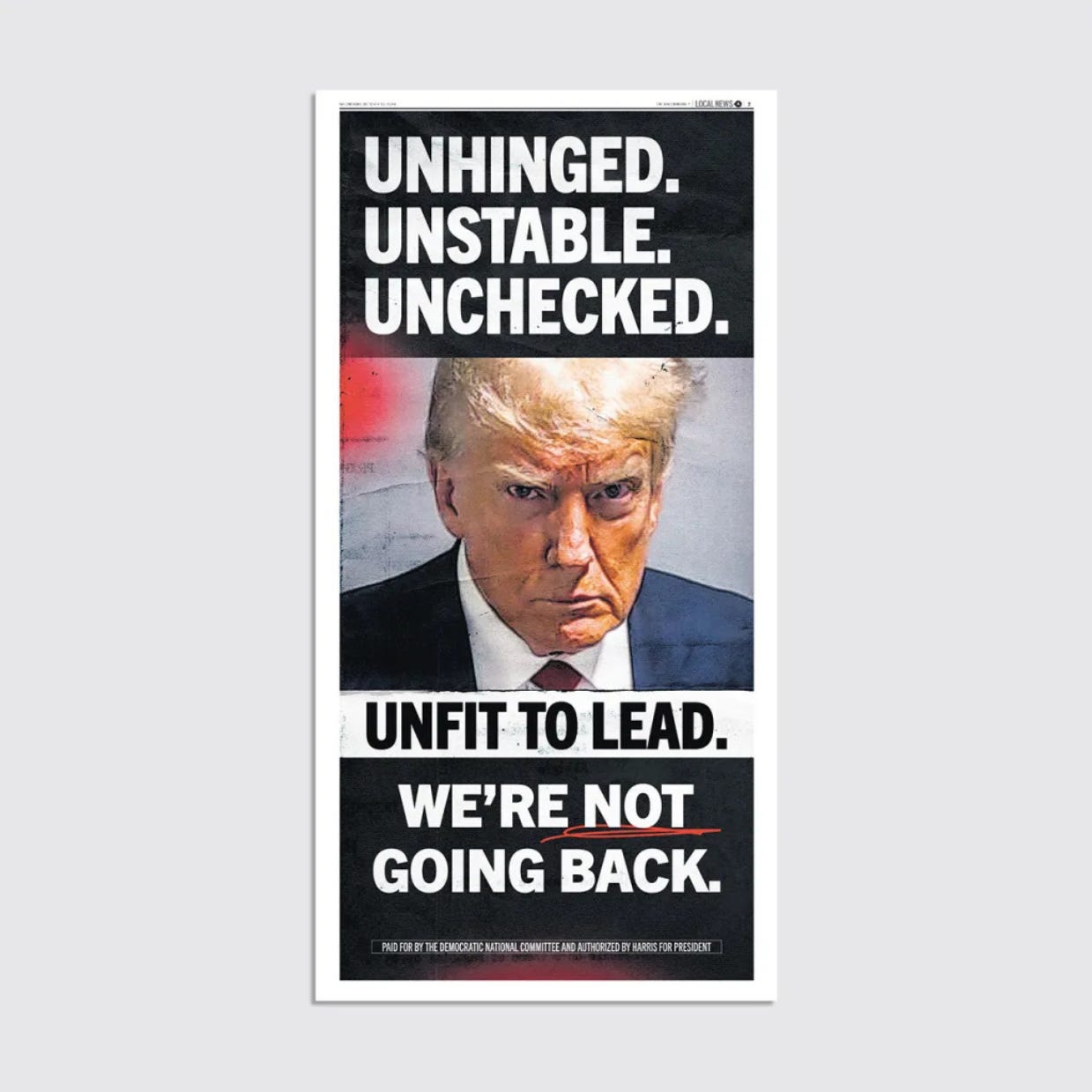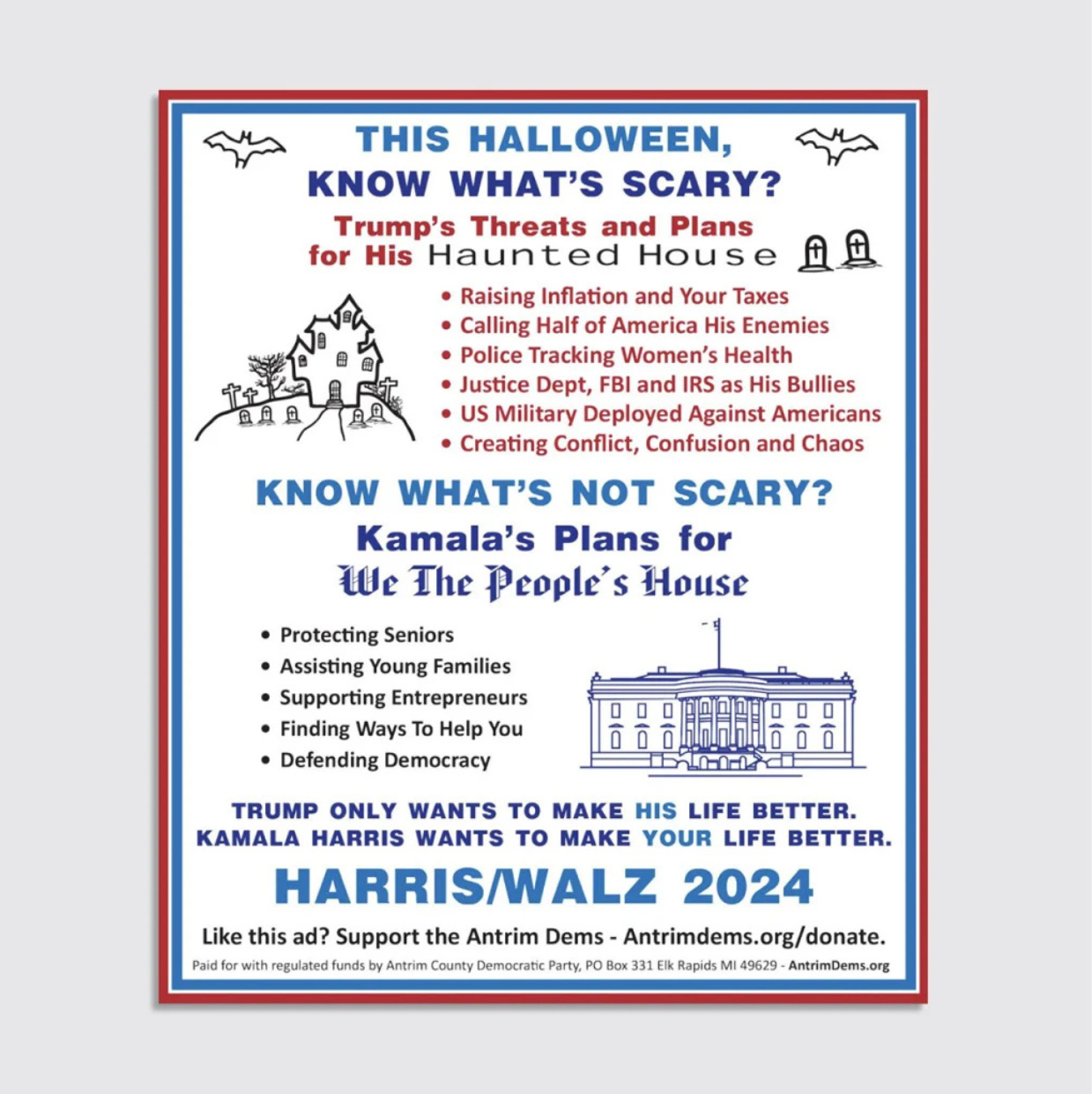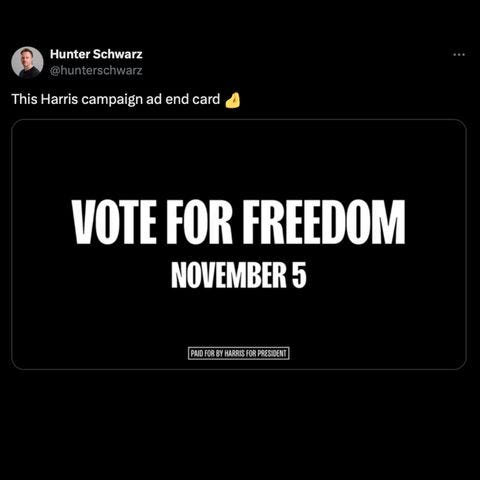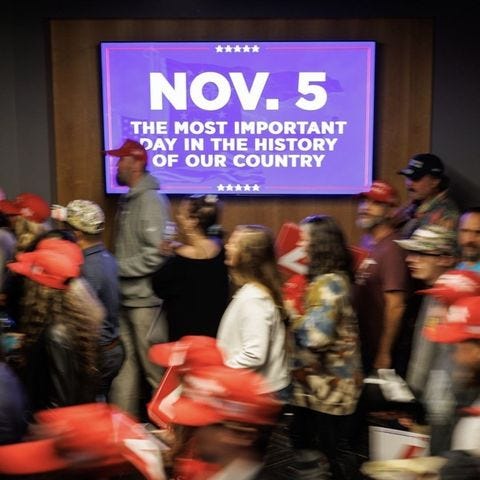The quiet reason these campaign ads remind viewers their vote is secret
Plus: Democrats are running anti-Trump ads in good old fashioned newspapers
Hello, in this issue we’ll look at why one progressive evangelical group is using famous voices to remind voters about secret ballots, and the anti-Trump print ads that ran in mid-sized newspapers.
Scroll to the end to see: the typography behind the campaign’s closing get-out-the-vote messages 📣
Today’s issue is sponsored by Whig, my newsletter about politics, First Families, and pop culture. Subscribe here:
The quiet reason these campaign ads remind viewers their vote is secret
Shhh… the biggest secret of the 2024 race could end up being voters who keep quiet about who they’re voting for.
Two of Vice President Kamala Harris’ most famous supporters are narrating new ads from Vote Common Good, a progressive evangelical group. George Clooney and Julia Roberts narrate his-and-hers ads about voting your conscience without telling anyone. Clooney’s ad “Remember Who We Love The Most When We Vote” shows a man walking into a polling place with his male buddies, one of whom says, “come on, boys, let’s make America great again.”
“Before you cast your vote in this election, think about how it’ll impact the people you care about the most,” Clooney says, showing the man, a father, mark his ballot for Harris. “What happens in the booth stays in the booth. Vote Harris-Walz.”
Roberts’ ad, “Your Vote, Your Choice,” also references male pressure, this time in the form of a woman’s husband telling her, “It’s your turn, honey,” when she goes to vote. She too votes for Harris, and when her husband asks, “Did you make the right choice?” she responds, “Sure did, honey,” and gives her female friend a knowing glance.
“In the one place in America where women still have a right to choose, you can vote any way you want and no one will ever know,” Roberts says.
Urging voters to cross party lines has long been an important part of building an election-winning coalition, but Republican Harris supporters see it as especially important this year. Former Rep. Liz Cheney (R-Wyo.) said last month on CBS News she thinks “you're going to have, frankly, a lot of men and women who will go into the voting booth and will vote their conscience and will vote for Vice President Harris. They may not ever say anything publicly but the results will speak for themselves.” These ads are an attempt to make these secret voters visible.
YouGov polling released this week found one in eight women have secretly voted differently than their partners, so some women who see the Roberts-narrated ad will relate, but the message that your vote is secret is a particularly important one for people who don’t normally vote.
Misconceptions about voter privacy are widespread, Yale researchers found in a field experiment published in 2019, particularly among non-voters. “We find that people who have not previously voted are particularly likely to harbor doubts about the secrecy of voters’ ballots,” the study’s authors wrote.
Voting can be intimidating enough if don’t do it regularly, doubly so if you think people will be able to find out you voted for a candidate your loved ones might not approve of. By letting people know their vote is secret, Harris’ Hollywood supporters are doing their part to help nudge irregular or non-voters to the polls.
Democrats are running anti-Trump ads in good old fashioned newspapers
Democrats are going old school for their latest advertising play in battleground states.
The Democratic National Committee ran full-page print newspaper ads Wednesday that show Trump’s mugshot in full color overlaid with black-and-white text that reads, “Unhinged. Unstable. Unchecked. Unfit to Lead. We’re Not Going Back.”
It’s an uncompromisingly anti-Trump message that complements the DNC’s physical billboard strategy, and it’s an attempt to remind swing-state newspaper readers that Trump would be the first convicted felon to become president-elect if he wins.
The DNC placed the ads in 25 small, regional newspapers in seven swing states, like the suburban Erie Times-News in Pennsylvania and the Macomb Daily in Southeast Michigan, as well as the more rural Northern Express in Northern Michigan, according to The New York Times. The Times adds that this is an attempt to reach moderate suburban voters. It’s possible these local print ad placements are also a move to reach older voters or those who spend less time online to get them to the polls.
Another reason? Newspaper readers as a group are likely to vote. The Pew Research Center found in 2016 that following local news and always voting are closely correlated because civically engaged people tend to do both. Election Day is less than a week away, so it makes sense that the campaign is teeing up a final, can’t-miss communications push to people who are more inclined to get out to the polls in the first place.
There are others running political ads in print newspapers too, from local groups like Northern Michigan’s Antrim County Democrats, who ran their own Halloween-themed ad in Northern Express to compare Trump and Harris on policy. “This Halloween, know what’s scary?” the ad reads. “Trump’s threats and plans.” Meanwhile in Arizona, political groups like Republicans and Independents for America are running long-form text ads in The Arizona Republic urging Republicans and Independents not to vote for Trump.
Though ads on social media and streaming services offer a targeted way to reach voters, print newspaper advertising is still a viable way to target voters. These voters are likely to skew older and be engaged citizens of their communities. Reaching them in print and ink in a news source they trust could pay big dividends since they’re more likely to vote. It’s election crunch time and campaigns aren’t about to limit hyperlocal targeting to one medium.
Have you seen this?
More than $10 billion has been spent on ads in the 2024 election. That total is up $1 billion from four years ago. [NPR]
How Trump’s garbage truck stunt became a dumpster fire online. Trump put together a splashy stunt to highlight Joe Biden’s “garbage” gaffe. It does not seem to have gone over the way he intended. [Fast Company]
Mark Cuban shows Democrats what they’ve been missing. The reality-show billionaire is delivering a Harris-Walz message more effectively than the Democratic ticket. Put simply: for many Americans, business leaders are credible messengers on the economy. [Politico]
Carrie Mae Weems lends images for Kamala Harris ad. A few photographs from the artist’s famed “Kitchen Table Series” appear in a new video promoting the vice president’s campaign. [The Art Newspaper]
History of political design
Trump and Harris campaign get-out-the-vote typography (2024). This is for history. The Harris campaign used this stark black-and-white end card that writes out “Vote For Freedom November 5" in Sans Plomb for its closing ad “Our Next Chapter.”
And the Trump campaign has brought out the MAGA Box for GOTV messaging like this signage at a rally in Georgia last week calling Nov. 5 “The Most Important Day In The History of our Country.” Click through for more.
A portion of this newsletter was first published in Fast Company.
Like what you see? Subscribe for more:

